外研版高中英语选修7 Module3 Literature Reading and Vocabulary 课件(共38张PPT)
文档属性
| 名称 | 外研版高中英语选修7 Module3 Literature Reading and Vocabulary 课件(共38张PPT) | 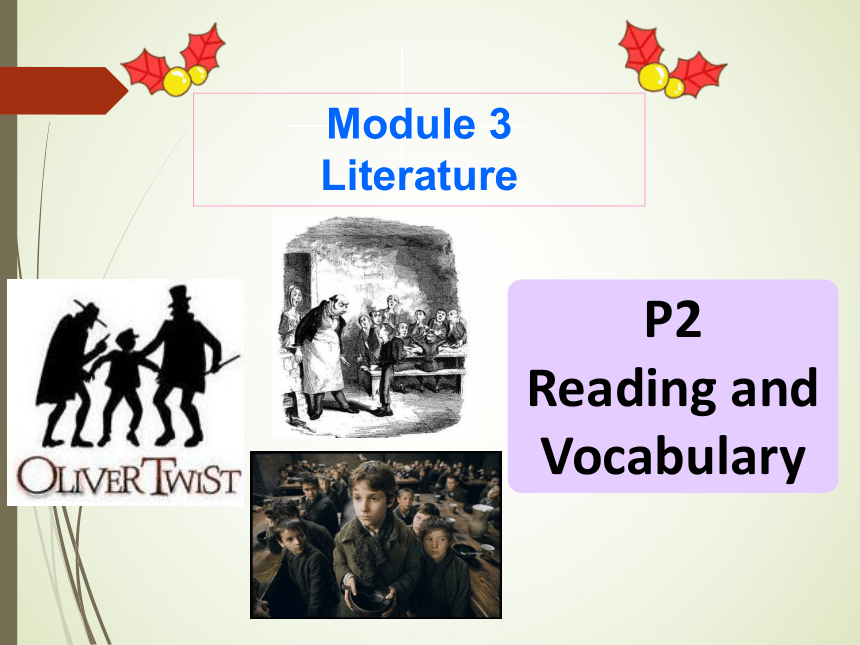 | |
| 格式 | zip | ||
| 文件大小 | 1.2MB | ||
| 资源类型 | 教案 | ||
| 版本资源 | 外研版 | ||
| 科目 | 英语 | ||
| 更新时间 | 2019-05-12 08:19:12 | ||
图片预览


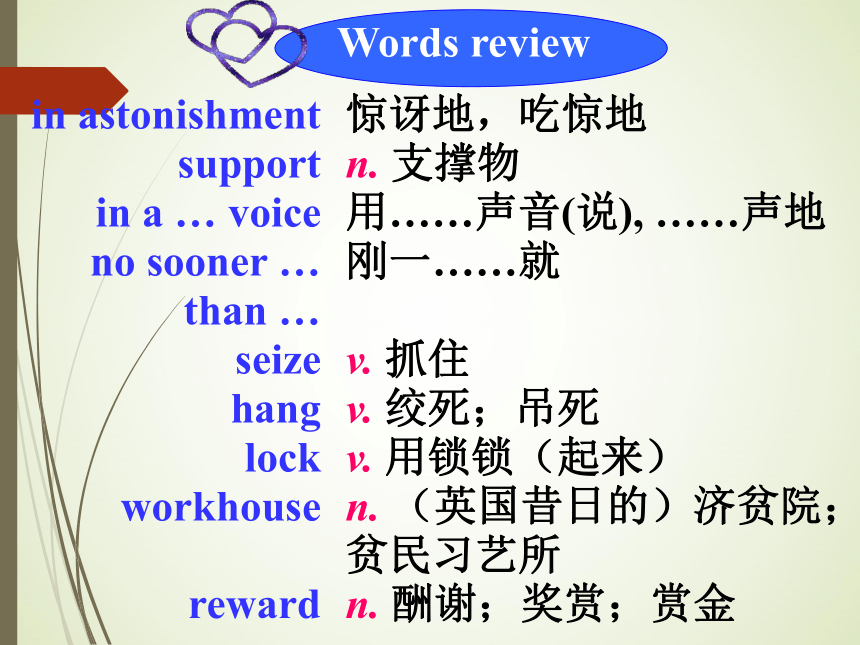
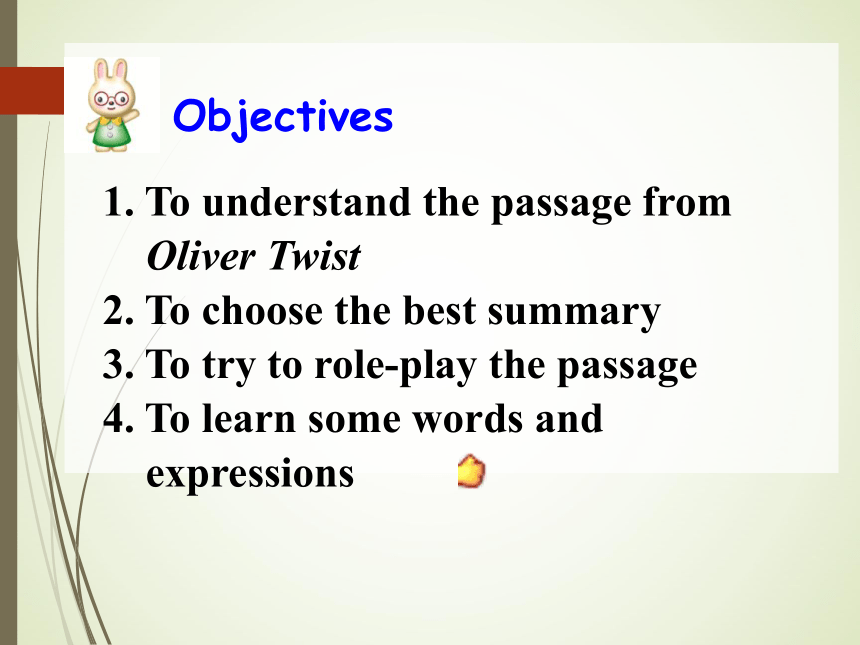
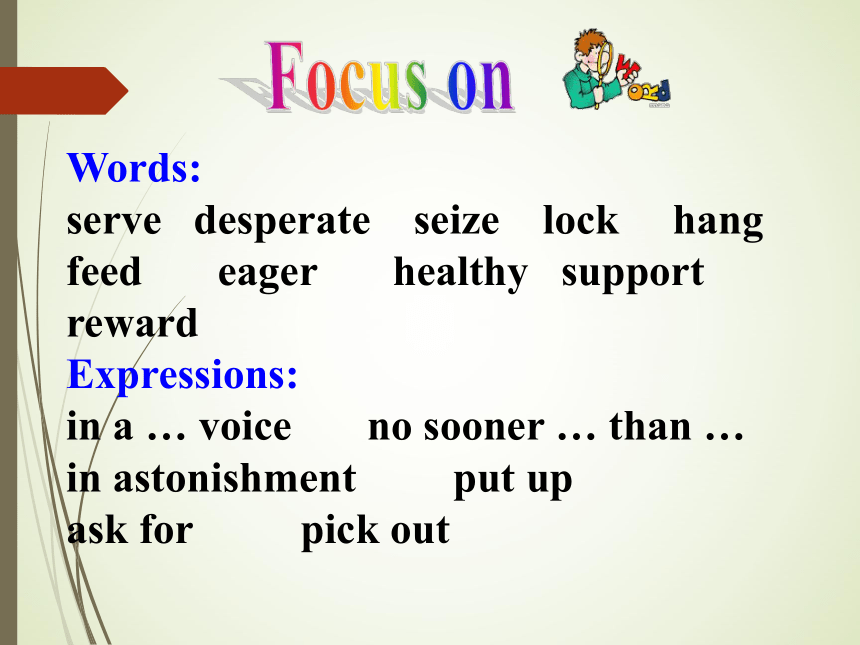
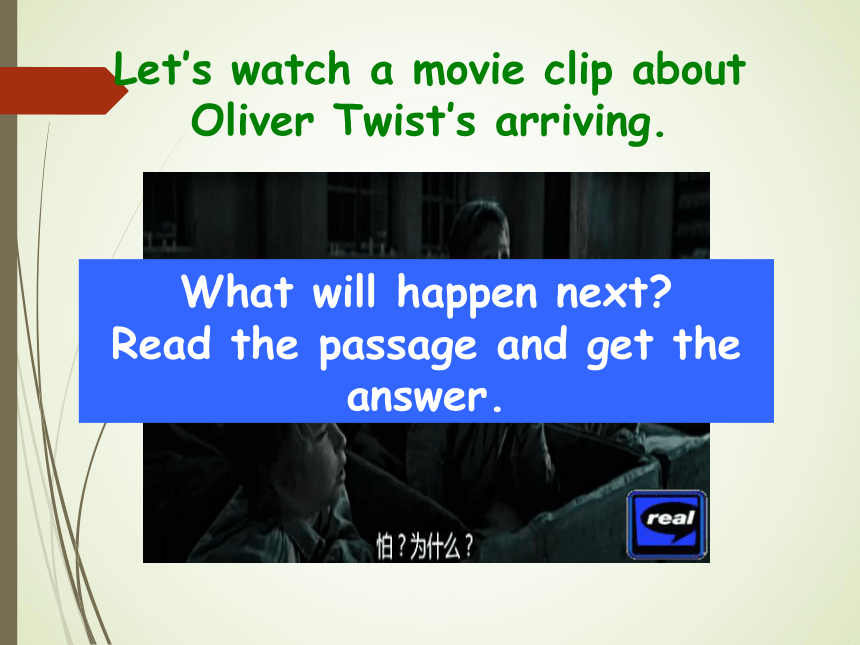

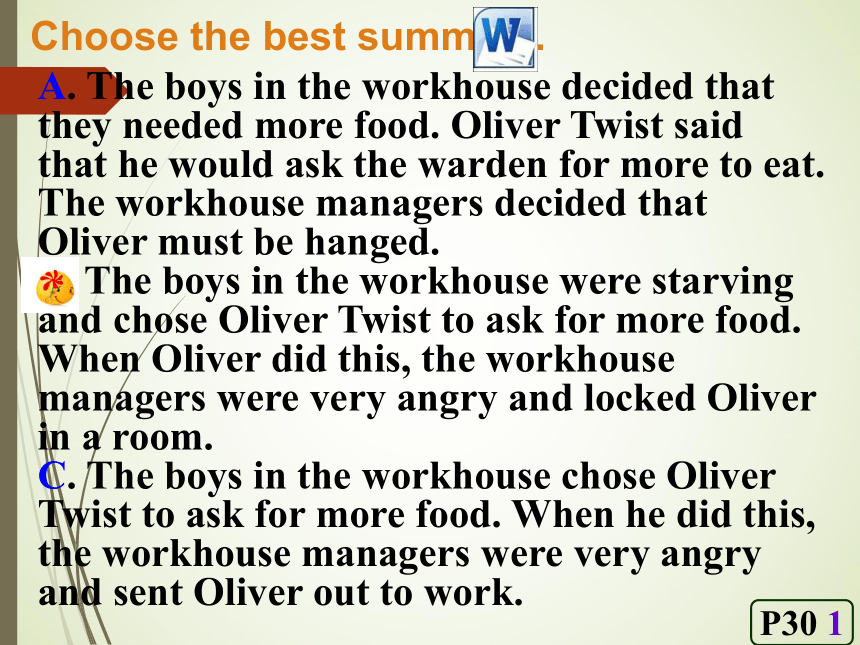
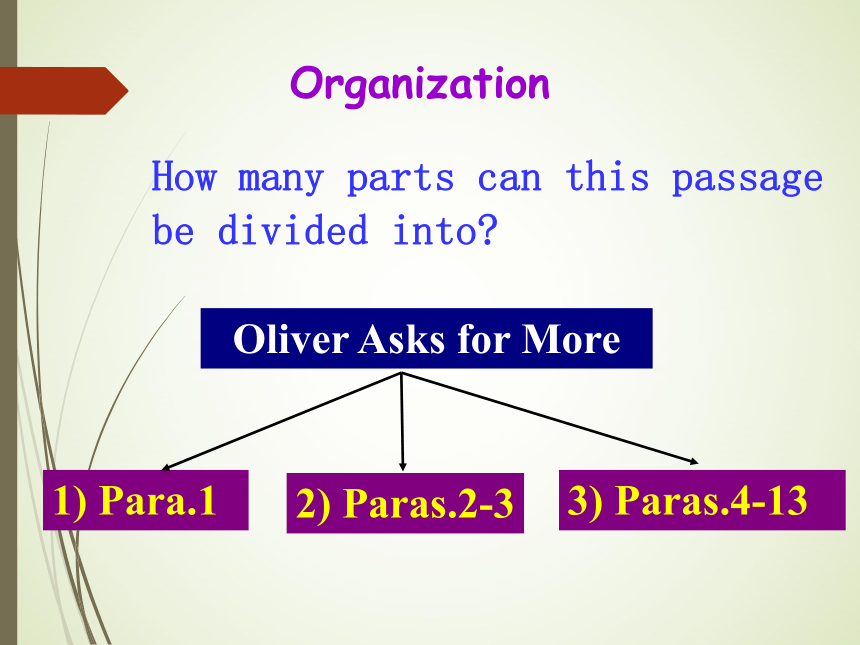


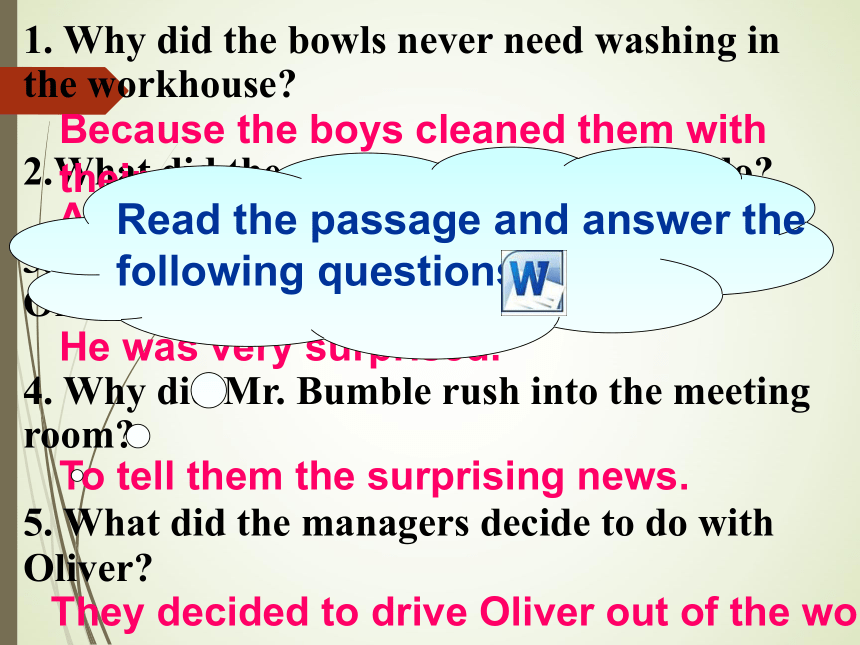
文档简介
课件38张PPT。Module 3
LiteratureP2
Reading and Vocabulary feed
pot
warden serve
eager
appetite
whisper
nudge
desperate
healthyv. 喂养;为……提供食品
n. 锅
n. 管理员
v. 端上(饭菜等)
adj. 热切的;渴望的
n.胃口,食欲
v. 低声地说;耳语
v. 推开
adj. 绝望的
adj. 健康的 Read after the tape and speak out the Chinese immediately.in astonishment
support
in a … voice
no sooner … than …
seize
hang
lock
workhouse
reward惊讶地,吃惊地
n. 支撑物
用……声音(说), ……声地
刚一……就
v. 抓住
v. 绞死;吊死
v. 用锁锁(起来)
n. (英国昔日的)济贫院;贫民习艺所
n. 酬谢;奖赏;赏金Objectives1. To understand the passage from
Oliver Twist
2. To choose the best summary
3. To try to role-play the passage
4. To learn some words and
expressionsWords:
serve desperate seize lock hang feed eager healthy support reward
Expressions:
in a … voice no sooner … than …
in astonishment put up
ask for pick out Focus onWhat will happen next?
Read the passage and get the answer.Let’s watch a movie clip about
Oliver Twist’s arriving. for
general ideasSkimmingA. The boys in the workhouse decided that they needed more food. Oliver Twist said that he would ask the warden for more to eat. The workhouse managers decided that Oliver must be hanged.
B. The boys in the workhouse were starving and chose Oliver Twist to ask for more food. When Oliver did this, the workhouse managers were very angry and locked Oliver in a room.
C. The boys in the workhouse chose Oliver Twist to ask for more food. When he did this, the workhouse managers were very angry and sent Oliver out to work.Choose the best summary.P30 1How many parts can this passage
be divided into? 1) Para.12) Paras.2-33) Paras.4-13Oliver Asks for MoreOrganizationPart 1.
Part 2.
Part 3.Main idea of each part.Why Oliver was chosen to ask
for more food and what Oliver
said to the warden that evening.
Why the warden hit Oliver on
the head and how Oliver was
punished by the managers of
the workhouse.
The living condition of the boys
was very poor and there they
suffered from hunger badly. for
specific informationScanning1. Why did the bowls never need washing in the workhouse? 2.What did the other boys tell Oliver to do?
3. How did the warden feel when he heard Oliver’s words?
4. Why did Mr. Bumble rush into the meeting room?
5. What did the managers decide to do with Oliver? Because the boys cleaned them with their spoons.They decided to drive Oliver out of the workhouse.To tell them the surprising news.He was very surprised.Ask for more food from the warden.Read the passage and answer the following questions. 1. The boys in the workhouse were given
one bowl of soup and another 60
grams of bread each day.
2. The tall boy was not used to being
hungry all the time.
3. No one believed that the tall boy could
eat that small boy.
4. If the boys hadn’t been very hungry,
they wouldn’t have chosen Oliver to
ask for more food.Everyone on special holidays.Read the passage again and complete
these sentences.1. On special holidays the boys were
allowed to eat _______________________.
2. The boys stared at the pot because
____________________________________
_____.
3. The boys decided that one of them should ask for more food because _____________
___________________________________.another 60 grams of breadthey were very hungry and wanted more
to eat they thought one big boy would eat another small boyP32 44. The warden’s face became very pale because ____________________________
____.
5. When Oliver repeated his words, the warden ______________________________.
6. Mr Bumble told the managers of the workhouse that _______________________.
7. In order to punish Oliver, the managers ___________________.
8. The managers did not want Oliver to
____________________.hit him on the head with the spoonOliver had asked for morelocked him in a roomstay in the workhousehe was astonished by what Oliversaidthreewildcook shopask for more foodFill in the blanks.moreOliver desperateastonishmentnoticerewardon the head重难点句子分析Careful Reading1. The room in which the boys were fed was a large stone hall, with a large pot at one end.定语从句with复合宾语结构作定语【Sentences we’ve learned】
1. Physics will never be my favourite lesson, but I think that I’ll do well in the exam with Mrs Chen teaching me. (Book 1 P12)
2. The warden stood by the pot with his assistants in a line behind him. (P30)
3. Oliver, who was desperate with hunger and misery, rose from the table and walked towards the master with his bowl and spoon in his hand. (P30)孩子们进食的场所是一间宽敞的大石厅,一口锅放在大厅一侧。with的复合结构既可在句中作状语,也可作后置定语。 状语定语名词/
代词1. We're an international company with offices in
Paris, New York, and Sydney.
2. A woman with a baby in a stroller (幼儿推车)
was looking at clothes.
3. He was lying on the bed with all his clothes on.
4. He left the room with the door open.
5. He was asleep with his head on his arms.
6. With so much homework to do, I can't go out.
7. With everything well arranged, he left the office.
8. With blood pouring from his leg,?he made it to a
nearby house.? 副词/形容词/介词短语/
不定式/V-ed/V-ingwith++with宾语宾语补足语feed: to give food to a person, group, or animal 给(人、团体或动物)提供食物;喂养feed?sb./sth./yourself
1. Have you fed the cat yet?
2. Let's feed the kids first and have our dinner after.
3. The baby can't feed itself yet (= can't put food into its own mouth).
4. [ + two objects ] Do you feed your chickens corn? 你给鸡喂玉米吗?feed sth. to sb.
Several children were feeding bread to the ducks.
The barley (大麦) is fed to the cattle.
feed sb. on/with sth.
They were fed well on her mother’s home cooking.
她妈妈做的家常菜他们吃的很好。
The cattle are fed (on) barley.practice 1. 我喜欢沿着这条两岸都长满鲜花绿
草的小河走。
I enjoy walking along the river with
grass and flowers on both sides.
2. 他曾经就读过的学校很出名。
The school in which he once studied
is very famous.
3. I usually feed the neighbour's cat while
she's away.
邻居不在家时,我经常替她喂猫。2. When they had cleaned their bowls in this way, they would sit staring at the pot with eager eyes, as if they wanted to eat it.As if?and?as though?have a similar meaning. We use?as if?and?as though?to talk about an imaginary situation or a situation that may not be true but that is likely or possible.?As if?is more common than?as though.
e.g. 1. The floods were rising and it was?as if?it was the end of the world.
2. It looks as if they’ve had a shock.
3. It looks as though you’ve not met before.时间状语从句V-ing短语作伴随状语状语从句他们这样把碗刮干净后,就坐在那儿,眼巴巴地瞅着汤锅,似乎要把它也吞进肚子。She looks as if she were ten years younger.
It seems as if our team is going to win.
I’ve got so much work it looks as if I’ll have to stay at home this evening.
He looked as though he was ill.
It seems as if it is going to rain.As if和as though还可引导表语从句,一般接在look, seem等系动词后。For referencestare: to look for a long time with the eyes wide open, especially when surprised, frightened, or thinking(尤指惊讶、害怕或思考时)盯着看,凝视,注视I screamed and everyone stared.
我尖叫一声,众人都盯着我看。
I stared blankly at the paper in front of me.
我茫然地看着面前这张纸。
He sat staring into space (= looking at nothing).
他坐在那儿凝视着前方。stare at: 瞅,盯着看,凝视Don't stare at people like that, it's rude.
不要那样盯着人看,很不礼貌。【辨析】glance at; stare atThe girl glanced at (瞥了一眼) the people around and found a man staring at (正盯着) her.1. He talked about Rome as if he had been there before.
他说起罗马来好像他以前去过罗马似的。
2. It was John who broke the window. Why are you talking to me as if I had done it?
是约翰打破的窗户,为什么你和我说话的样子好像是我打破的似得。
3. There is no greater pleasure than lying on my back in the middle of the grassland, staring at the night sky.
没有比背躺在草地中盯着夜空更快乐的事情了。 practice 3. No sooner had the boy spoken these words than the warden hit him on the head with the soup spoon.no sooner … than …: used to show that one thing happens immediately after another thing 刚……就……;一……就……,no sooner后面的句子常用过去完成时,than后面的句子用一般过去时。no sooner位于句首时,其后的句子用倒装语序。打某人的头【More examples】
1. No sooner had he sat down than the phone rang.
2. No sooner had she said it than she burst into tears.
3. No sooner had the meeting come to an end than I hurried to the airport.
4. No sooner had I fallen asleep last night than I heard a knock at the door.hit?sb./sth. with sth.
e.g. He hit the nail squarely on the head with the hammer. 他用锤子正对着钉子敲下去。
She hit him on the head with her umbrella.
她用雨伞打他的头。
The robbers hit him over the head with a baseball bat.
劫匪用棒球球棒击打他的头部。孩子的话刚出口,大师傅就操起勺子狠狠地敲他的脑袋。practice 1. 我刚开始修剪草坪就下起了雨。
No sooner had I started mowing the
lawn than it started raining.
2. 她用锤子砸了自己的拇指。
She hit her thumb with the hammer.Post-readingactivitiesBoys in the workhouse were always starving, for each one was allowed one bowl of soup. Three months later they became quite ______________. Finally they decided to _____ one ______ to ask for more food. _______ Oliver Twist _________ was chosen. In the evening, after Oliver ate his soup, he walked to the master and said, “Please sir, I want some more.” ________ had he spoken these words ________ the warden hit him on the head _____ the spoon. Then the managers of the workhouse had a meeting. Oliver was immediately _______ in a room. And the next morning a notice was _________ on the door, offering a ________ to anybody who would employ Oliver Twist. wild with hunger pick outIt was whoNo soonerthanlockedput uprewardwithFill in the blanks to finish the Summary of the text and then try to retell it.注: word 文档
点击此处链接Benefits of literatureLiterature provides pleasure for listeners and readers. Literature builds experience.?Literature provides a language model for those who hear and read it.? Literature helps you deal with your problems. Literature improves reading ability and attitudes.? The test of real literature is that it will bear repetition. We read over the same pages again and again, and always with fresh delight.
What is wonderful about great literature is that it transforms the man who reads it towards the condition of the man who wrote.Two things to remember:Spelling Bee1. English-Chinese
whisper desperate reward eager
in astonishment in a … voice
2. Chinese-English
抓住 端上(饭菜等) 刚一……就
喂养 用锁锁 张贴 When finishing, exchange your papers to see who does the best.Now 2 minutes to test your spelling.Review课时重点回顾in astonishment
be wild with hunger
in a … voice
in great excitement
put up
no sooner … than …惊讶地,吃惊地
由于饥饿而疯狂
用……声音(说);……声地
十分激动地
张贴
刚一……就Homework1. Give an ending to the story.
2. Read the articles in Learning English.
The more you read, the faster and
better you’ll understand. When
finishing reading, write a summary
in 100 words or so.
3. Preview Grammar.
LiteratureP2
Reading and Vocabulary feed
pot
warden serve
eager
appetite
whisper
nudge
desperate
healthyv. 喂养;为……提供食品
n. 锅
n. 管理员
v. 端上(饭菜等)
adj. 热切的;渴望的
n.胃口,食欲
v. 低声地说;耳语
v. 推开
adj. 绝望的
adj. 健康的 Read after the tape and speak out the Chinese immediately.in astonishment
support
in a … voice
no sooner … than …
seize
hang
lock
workhouse
reward惊讶地,吃惊地
n. 支撑物
用……声音(说), ……声地
刚一……就
v. 抓住
v. 绞死;吊死
v. 用锁锁(起来)
n. (英国昔日的)济贫院;贫民习艺所
n. 酬谢;奖赏;赏金Objectives1. To understand the passage from
Oliver Twist
2. To choose the best summary
3. To try to role-play the passage
4. To learn some words and
expressionsWords:
serve desperate seize lock hang feed eager healthy support reward
Expressions:
in a … voice no sooner … than …
in astonishment put up
ask for pick out Focus onWhat will happen next?
Read the passage and get the answer.Let’s watch a movie clip about
Oliver Twist’s arriving. for
general ideasSkimmingA. The boys in the workhouse decided that they needed more food. Oliver Twist said that he would ask the warden for more to eat. The workhouse managers decided that Oliver must be hanged.
B. The boys in the workhouse were starving and chose Oliver Twist to ask for more food. When Oliver did this, the workhouse managers were very angry and locked Oliver in a room.
C. The boys in the workhouse chose Oliver Twist to ask for more food. When he did this, the workhouse managers were very angry and sent Oliver out to work.Choose the best summary.P30 1How many parts can this passage
be divided into? 1) Para.12) Paras.2-33) Paras.4-13Oliver Asks for MoreOrganizationPart 1.
Part 2.
Part 3.Main idea of each part.Why Oliver was chosen to ask
for more food and what Oliver
said to the warden that evening.
Why the warden hit Oliver on
the head and how Oliver was
punished by the managers of
the workhouse.
The living condition of the boys
was very poor and there they
suffered from hunger badly. for
specific informationScanning1. Why did the bowls never need washing in the workhouse? 2.What did the other boys tell Oliver to do?
3. How did the warden feel when he heard Oliver’s words?
4. Why did Mr. Bumble rush into the meeting room?
5. What did the managers decide to do with Oliver? Because the boys cleaned them with their spoons.They decided to drive Oliver out of the workhouse.To tell them the surprising news.He was very surprised.Ask for more food from the warden.Read the passage and answer the following questions. 1. The boys in the workhouse were given
one bowl of soup and another 60
grams of bread each day.
2. The tall boy was not used to being
hungry all the time.
3. No one believed that the tall boy could
eat that small boy.
4. If the boys hadn’t been very hungry,
they wouldn’t have chosen Oliver to
ask for more food.Everyone on special holidays.Read the passage again and complete
these sentences.1. On special holidays the boys were
allowed to eat _______________________.
2. The boys stared at the pot because
____________________________________
_____.
3. The boys decided that one of them should ask for more food because _____________
___________________________________.another 60 grams of breadthey were very hungry and wanted more
to eat they thought one big boy would eat another small boyP32 44. The warden’s face became very pale because ____________________________
____.
5. When Oliver repeated his words, the warden ______________________________.
6. Mr Bumble told the managers of the workhouse that _______________________.
7. In order to punish Oliver, the managers ___________________.
8. The managers did not want Oliver to
____________________.hit him on the head with the spoonOliver had asked for morelocked him in a roomstay in the workhousehe was astonished by what Oliversaidthreewildcook shopask for more foodFill in the blanks.moreOliver desperateastonishmentnoticerewardon the head重难点句子分析Careful Reading1. The room in which the boys were fed was a large stone hall, with a large pot at one end.定语从句with复合宾语结构作定语【Sentences we’ve learned】
1. Physics will never be my favourite lesson, but I think that I’ll do well in the exam with Mrs Chen teaching me. (Book 1 P12)
2. The warden stood by the pot with his assistants in a line behind him. (P30)
3. Oliver, who was desperate with hunger and misery, rose from the table and walked towards the master with his bowl and spoon in his hand. (P30)孩子们进食的场所是一间宽敞的大石厅,一口锅放在大厅一侧。with的复合结构既可在句中作状语,也可作后置定语。 状语定语名词/
代词1. We're an international company with offices in
Paris, New York, and Sydney.
2. A woman with a baby in a stroller (幼儿推车)
was looking at clothes.
3. He was lying on the bed with all his clothes on.
4. He left the room with the door open.
5. He was asleep with his head on his arms.
6. With so much homework to do, I can't go out.
7. With everything well arranged, he left the office.
8. With blood pouring from his leg,?he made it to a
nearby house.? 副词/形容词/介词短语/
不定式/V-ed/V-ingwith++with宾语宾语补足语feed: to give food to a person, group, or animal 给(人、团体或动物)提供食物;喂养feed?sb./sth./yourself
1. Have you fed the cat yet?
2. Let's feed the kids first and have our dinner after.
3. The baby can't feed itself yet (= can't put food into its own mouth).
4. [ + two objects ] Do you feed your chickens corn? 你给鸡喂玉米吗?feed sth. to sb.
Several children were feeding bread to the ducks.
The barley (大麦) is fed to the cattle.
feed sb. on/with sth.
They were fed well on her mother’s home cooking.
她妈妈做的家常菜他们吃的很好。
The cattle are fed (on) barley.practice 1. 我喜欢沿着这条两岸都长满鲜花绿
草的小河走。
I enjoy walking along the river with
grass and flowers on both sides.
2. 他曾经就读过的学校很出名。
The school in which he once studied
is very famous.
3. I usually feed the neighbour's cat while
she's away.
邻居不在家时,我经常替她喂猫。2. When they had cleaned their bowls in this way, they would sit staring at the pot with eager eyes, as if they wanted to eat it.As if?and?as though?have a similar meaning. We use?as if?and?as though?to talk about an imaginary situation or a situation that may not be true but that is likely or possible.?As if?is more common than?as though.
e.g. 1. The floods were rising and it was?as if?it was the end of the world.
2. It looks as if they’ve had a shock.
3. It looks as though you’ve not met before.时间状语从句V-ing短语作伴随状语状语从句他们这样把碗刮干净后,就坐在那儿,眼巴巴地瞅着汤锅,似乎要把它也吞进肚子。She looks as if she were ten years younger.
It seems as if our team is going to win.
I’ve got so much work it looks as if I’ll have to stay at home this evening.
He looked as though he was ill.
It seems as if it is going to rain.As if和as though还可引导表语从句,一般接在look, seem等系动词后。For referencestare: to look for a long time with the eyes wide open, especially when surprised, frightened, or thinking(尤指惊讶、害怕或思考时)盯着看,凝视,注视I screamed and everyone stared.
我尖叫一声,众人都盯着我看。
I stared blankly at the paper in front of me.
我茫然地看着面前这张纸。
He sat staring into space (= looking at nothing).
他坐在那儿凝视着前方。stare at: 瞅,盯着看,凝视Don't stare at people like that, it's rude.
不要那样盯着人看,很不礼貌。【辨析】glance at; stare atThe girl glanced at (瞥了一眼) the people around and found a man staring at (正盯着) her.1. He talked about Rome as if he had been there before.
他说起罗马来好像他以前去过罗马似的。
2. It was John who broke the window. Why are you talking to me as if I had done it?
是约翰打破的窗户,为什么你和我说话的样子好像是我打破的似得。
3. There is no greater pleasure than lying on my back in the middle of the grassland, staring at the night sky.
没有比背躺在草地中盯着夜空更快乐的事情了。 practice 3. No sooner had the boy spoken these words than the warden hit him on the head with the soup spoon.no sooner … than …: used to show that one thing happens immediately after another thing 刚……就……;一……就……,no sooner后面的句子常用过去完成时,than后面的句子用一般过去时。no sooner位于句首时,其后的句子用倒装语序。打某人的头【More examples】
1. No sooner had he sat down than the phone rang.
2. No sooner had she said it than she burst into tears.
3. No sooner had the meeting come to an end than I hurried to the airport.
4. No sooner had I fallen asleep last night than I heard a knock at the door.hit?sb./sth. with sth.
e.g. He hit the nail squarely on the head with the hammer. 他用锤子正对着钉子敲下去。
She hit him on the head with her umbrella.
她用雨伞打他的头。
The robbers hit him over the head with a baseball bat.
劫匪用棒球球棒击打他的头部。孩子的话刚出口,大师傅就操起勺子狠狠地敲他的脑袋。practice 1. 我刚开始修剪草坪就下起了雨。
No sooner had I started mowing the
lawn than it started raining.
2. 她用锤子砸了自己的拇指。
She hit her thumb with the hammer.Post-readingactivitiesBoys in the workhouse were always starving, for each one was allowed one bowl of soup. Three months later they became quite ______________. Finally they decided to _____ one ______ to ask for more food. _______ Oliver Twist _________ was chosen. In the evening, after Oliver ate his soup, he walked to the master and said, “Please sir, I want some more.” ________ had he spoken these words ________ the warden hit him on the head _____ the spoon. Then the managers of the workhouse had a meeting. Oliver was immediately _______ in a room. And the next morning a notice was _________ on the door, offering a ________ to anybody who would employ Oliver Twist. wild with hunger pick outIt was whoNo soonerthanlockedput uprewardwithFill in the blanks to finish the Summary of the text and then try to retell it.注: word 文档
点击此处链接Benefits of literatureLiterature provides pleasure for listeners and readers. Literature builds experience.?Literature provides a language model for those who hear and read it.? Literature helps you deal with your problems. Literature improves reading ability and attitudes.? The test of real literature is that it will bear repetition. We read over the same pages again and again, and always with fresh delight.
What is wonderful about great literature is that it transforms the man who reads it towards the condition of the man who wrote.Two things to remember:Spelling Bee1. English-Chinese
whisper desperate reward eager
in astonishment in a … voice
2. Chinese-English
抓住 端上(饭菜等) 刚一……就
喂养 用锁锁 张贴 When finishing, exchange your papers to see who does the best.Now 2 minutes to test your spelling.Review课时重点回顾in astonishment
be wild with hunger
in a … voice
in great excitement
put up
no sooner … than …惊讶地,吃惊地
由于饥饿而疯狂
用……声音(说);……声地
十分激动地
张贴
刚一……就Homework1. Give an ending to the story.
2. Read the articles in Learning English.
The more you read, the faster and
better you’ll understand. When
finishing reading, write a summary
in 100 words or so.
3. Preview Grammar.
